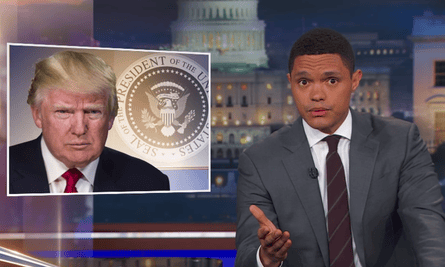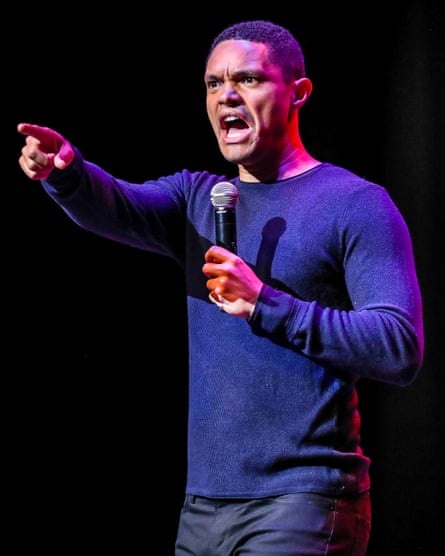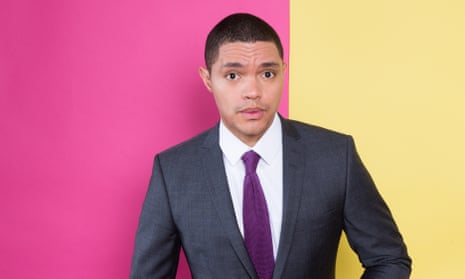It is a few hours before Trevor Noah takes his seat at The Daily Show’s presenting desk, from which – four nights a week – he lobs comedic grenades at 21st-century America. To prepare for the consuming task ahead, he goes for a gentle stroll. “Sometimes I take a walk to pull the pieces of the show together,” he says down the phone, to the background cacophony of downtown Manhattan. It can’t be the most relaxing refuge from the 24/7 stresses of high-stakes, late-night satire. “Luckily,” says Noah, “I’ve got a good resting heart rate. I’ve found a way to make this my normal.”
It wasn’t always certain he’d get that chance. When the little-known South African standup took over The Daily Show in 2015 from America’s conscience, Jon Stewart, ratings plummeted. By the time of Noah’s 100th episode, the show had lost 37% of its viewers. Worse, a published study claimed that Stewart’s departure hit voter turnout in the 2016 election – blaming Noah, in effect, for the Trump presidency. After a year in charge, he told the Guardian he felt only 30% of the way towards realising his vision for the show.
Yet here we are, three years on, and Noah’s tenure is a record-breaking hit. “The Daily Show is more culturally relevant than ever,” swoons Comedy Central chief Kent Alterman of its weekly average 56m video views online. “Led by Trevor’s brilliance, wit and ability to pierce through the cultural conversation, the [show is] a true multi-platform success.”

So where is the show at now? “I’d like to say 65%,” Noah suggests. “I’ve been able to make the stories we cover more global. I’ve managed to build a franchise” – yes, I’m afraid that’s the word he uses – “that appeals to a larger base of people: younger, more diverse. But it’s always a work in progress. I might think I’m 65% there, but it could turn out to be 90 – or less than 40.”
On tonight’s agenda is the women’s World Cup, Uber’s new helicopter service, Joe Biden’s campaign, and, of course, the US president. Don’t you ever leave him alone, Trevor? “Does he ever leave us alone?” Noah rejoinders.
“We’ve made many episodes that don’t mention Trump at all. But we are a satirical news show, and satire works best when it has a target.” Does he ever dream of making The Daily Show in the Obama era? “Oh, definitely. But I don’t know what that world would have been like. I came from South Africa, where our politics and some of our politicians are very reminiscent of Donald Trump. So in a weird way this is the only politics I know.”
Noah’s backstory has been well rehearsed – not least because he made a standup show out of it, which toured globally, then turned it into a book, Born a Crime. (He’s recently released a young adult version.) The son of a black African secretary and a white German Swiss expat, Noah was born in 1984 under apartheid, which criminalised interracial sex. On the one hand, his existence was a crime; on the other, he was technically a superior citizen to his own mother, and was called “master” – as a joke – by his grandfather.
His childhood in Soweto sounds Dickensian in its violence and poverty. His mum was shot by her abusive partner (she survived); young Trevor ate caterpillars and dog food to survive. And yet, Noah emerged from it all an optimist – partly a function, he has said, of being treated as special because he was half-white. His breakthrough standup show, That’s Racist, was striking for its lack of anger about the life he’d been forced to lead. To this day, the criticism he attracts as The Daily Show’s host is that he’s insufficiently political – too blandly upbeat, not fuelled by Stewart-grade levels of righteous anger.
Noah was a DJ and hawker of homemade CDs before he first saw standup, and – responding to a challenge – gave it a go himself. “The initial attitude towards him from other South African comedians was just confusion,” says Schalk Bezuidenhout, a younger compatriot who has opened for Noah at homecoming gigs.
“He was such a complete anomaly – and still is. He was able to do a one-man show really early in his career. Then he’d write a brand new show annually and tour it nationwide. We hadn’t seen that in this country: someone that writes at such a drastic pace and so well. He was just a natural, right from the beginning. Everyone was like: who is this guy, where has he come from, and how is this possible?”
It wasn’t just that Noah wrote fast and well, but that he wrote topically. “Where most comedians would have a few lines about ‘this thing happened in the news’, Trevor would do 10, 20 minutes on it, the night it happened,” says Bezuidenhout. “But it would be so polished, like a gag he’d been doing for years.”
Those who saw Noah’s 2018 gig at London’s O2 can back this up. It took place on the day of Meghan Markle’s wedding to Prince Harry – and Noah wrung a big-hitting 20 minutes out of the day’s events, right at the top of his show.
The more I talk to Noah, however, the more apparent is the difference between his agenda and (what was assumed to be) his predecessor’s. “What makes satire great,” says Noah, “is that you can speak about issues people don’t want to engage in, because you’re using comedy to get into their brains. It’s an opportunity to spur conversations. That’s what I look at The Daily Show as doing.”
He cites the show’s material on Joe Biden’s inappropriately handsy behaviour, or on police brutality – “not easy subjects to talk about, and a lot of the time people would rather not. But in a weird way comedy helps you to tackle serious subjects. Because I’m not trying to be an arbiter or a preacher, I’m just trying to raise questions I feel should be addressed.”

Noah makes clear that he seeks to be judged not by the force of his arguments, or by whose minds he changes, but by the quality of the conversation he fosters. That’s partly in his nature: he’s a bridge-builder. It’s also because his predecessor advised him to keep things light. “Relish the fact that you can make jokes about these things,” Noah remembers Stewart telling him, “because there will come a day when you are too angry to laugh.”
But this even-handedness is also related to Noah’s nationality – to his un-Americanness, in effect. “I come from a different place,” he says, “both metaphorically and literally. I’m not entitled to tell people what to do in their country. Jon could tell the audience what was happening in America and say: ‘Is this who we are?’ But I’ll make it more of a global issue. I’ll say: ‘Hey – this is something that is happening all over the world.’ If you just focus on America, you may not be able to solve the problem, because it’s not an American one. It’s something that’s growing all over the globe.”
In this, Noah is following the teachings of his mentor Eddie Izzard, who helped bankroll the South African’s first international gigs – including those at the Edinburgh fringe in 2012. “Eddie loved that idea of going round the world, using comedy to bring people together – and thinking of yourself as a global citizen.”
As opposed to Theresa May’s “citizen of nowhere”? “That was a depressing thing for her to say,” says Noah. “Because there is no problem that is isolated to one place or people. All that happens is a problem stays in a place for longer or it comes to you sooner. But either way, it’s gonna become your problem.”
Does Noah feel like a Trojan horse, smuggling internationalist thinking into a country not known for its openness to non-American perspectives? “Not a Trojan horse,” he demurs, “because the Trojans were coming in to destroy the other people’s city. Whereas I love America and am hugely influenced by America.”
Says Bezuidenhout: “Trevor’s actually like America’s therapist. He’s the outside person that can really give perspective on the issues, because he’s not involved.”
To maintain a sense of neutrality, of course, Noah must avoid going native – a distant prospect, he argues, in a city as multicultural as New York. Add to that his regular trips back to South Africa, where he runs an educational foundation (and visits his mum). And a new transatlantic standup tour, Loud & Clear, to keep that international perspective pin-sharp.
The British dates are in April 2020, and here’s hoping that Noah uses them to update his dusty ideas about UK politics. In response to my question about why late-night TV satire has never taken off in Britain, Noah proffers that “your politicians are really good at tempering their language. You don’t have politicians who are as crazy or extreme”.
He does, however, credit the UK with helping make him the comic he is today: clued-up, “culturally relevant” and – a quick look at his watch – overdue back at The Daily Show studio.
“When I started doing comedy in America, it was just about the jokes,” says Noah. “The UK was the first place I came to where audiences pushed me, almost saying: ‘Hey, anyone can tell a joke, But what’s behind the joke? Do you have an opinion? Can you make us think?’ And I’m eternally appreciative of that.”
Trevor Noah plays O2 Arena, SE10, 3 & 4 April 2020; Schalk Bezuidenhout is at the Pleasance Courtyard, Edinburgh, 31 July to 26 August
